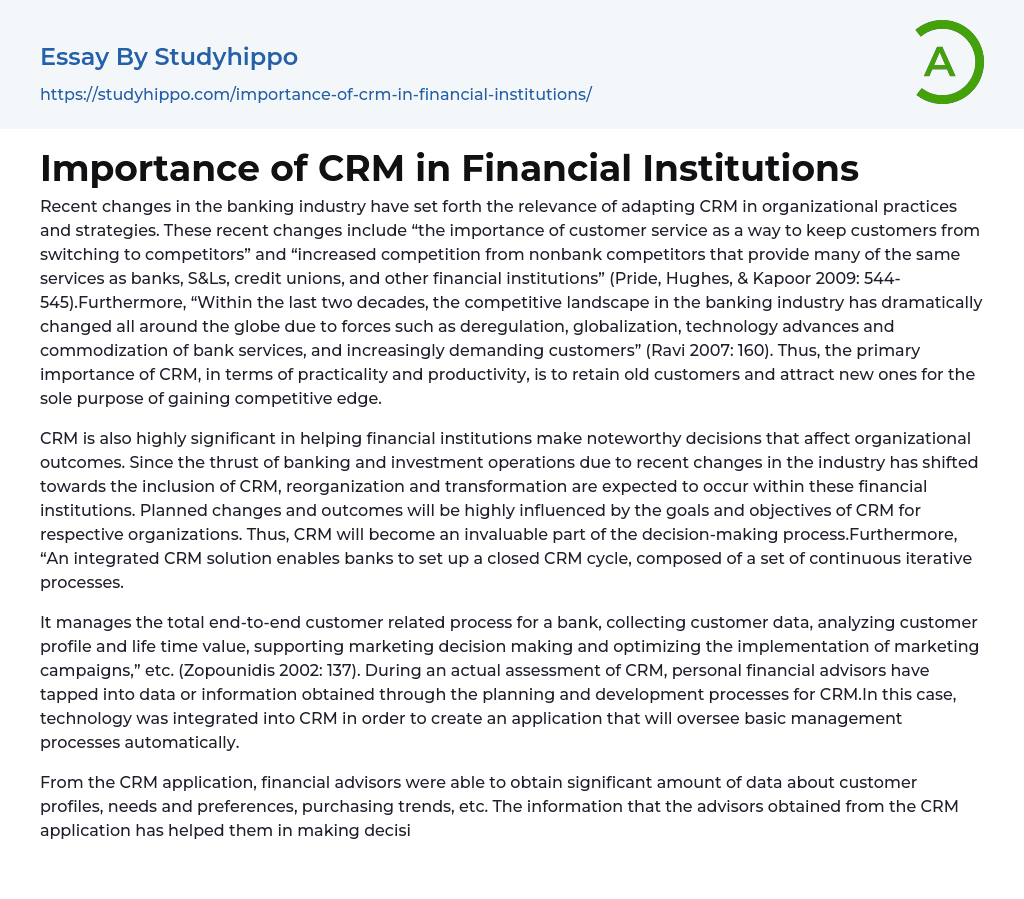

Importance of CRM in Financial Institutions Essay Example
Recent changes in the banking industry have set forth the relevance of adapting CRM in organizational practices and strategies. These recent changes include “the importance of customer service as a way to keep customers from switching to competitors” and “increased competition from nonbank competitors that provide many of the same services as banks, S&Ls, credit unions, and other financial institutions” (Pride, Hughes, & Kapoor 2009: 544-545).Furthermore, “Within the last two decades, the competitive landscape in the banking industry has dramatically changed all around the globe due to forces such as deregulation, globalization, technology advances and commodization of bank services, and increasingly demanding customers” (Ravi 2007: 160). Thus, the primary importance of CRM, in terms of practicality and productivity, is to retain old customers and attract new ones for the sole purpose of gaining competitive edge.
CRM is also highly signific
...ant in helping financial institutions make noteworthy decisions that affect organizational outcomes. Since the thrust of banking and investment operations due to recent changes in the industry has shifted towards the inclusion of CRM, reorganization and transformation are expected to occur within these financial institutions. Planned changes and outcomes will be highly influenced by the goals and objectives of CRM for respective organizations. Thus, CRM will become an invaluable part of the decision-making process.Furthermore, “An integrated CRM solution enables banks to set up a closed CRM cycle, composed of a set of continuous iterative processes.
It manages the total end-to-end customer related process for a bank, collecting customer data, analyzing customer profile and life time value, supporting marketing decision making and optimizing the implementation of marketing campaigns,” etc. (Zopounidis 2002: 137). During an actual assessment of CRM, personal
financial advisors have tapped into data or information obtained through the planning and development processes for CRM.In this case, technology was integrated into CRM in order to create an application that will oversee basic management processes automatically.
From the CRM application, financial advisors were able to obtain significant amount of data about customer profiles, needs and preferences, purchasing trends, etc. The information that the advisors obtained from the CRM application has helped them in making decisions about the strategies and approaches that they would use in order to develop and sell products and services to customers.(Khosrow-Pour 2004: 305) In another case, the Royal Bank of Canada (RBC) Financial Services, which is an institution that supports both personal and commercial financing, has adapted CRM as a strategies “of building unique relationships with individual clients, using a product that provides insights into client information and behavior” (Sharp 2003: 157). Since 1978, RBC Financial Services has been collating data from its customers to support the organization’s objective of fostering unique and desirable relationships with end users.At present time, RBC Financial Services proudly conveys the many contributions of CRM to the bank’s development, including decision-making processes that have assisted RBC to create and implement fitting and adequate strategies to compete and become successful.
The following are the benefits of CRM to RBC Financial Services: Increase in the Number of Customers: Nine million personal retail clients are now segmented into discrete segments based on attitudinal and behavioral factors – current and potential profitability, expected purchasing behavior, vulnerabilities, and channel preferences.High Quality Marketing Strategies: Marketing strategies for hundreds of micro-segments have been developed, leading to the ultimate objective of one-to-one marketing. Aligning Value
Chain or Proposition: Redefined client value measures and enhanced life stage segmentation have enabled the bank to align marketing initiatives.
DECISION-MAKING: Decision making and reporting for all marketing and sales initiatives have been streamlined with an accurate and concise assessment of client portfolios and their values.
- Commercial Bank essays
- Debit Card essays
- Deposit Account essays
- Subprime Lending essays
- Customer essays
- Customer Service essays
- Customer Satisfaction essays
- Target Market essays
- Advertising essays
- Audience Theory essays
- Competitor Analysis essays
- Consumer essays
- Marketing Management essays
- Marketing Mix essays
- Marketing Plan essays
- Marketing Research essays
- Marketing Strategy essays
- Point Of Sale essays
- Price essays
- Procurement essays
- Product essays
- Product Differentiation essays
- Promotion essays
- Promotion And Marketing Communications essays
- Retailing essays
- Trademark essays
- Anheuser-busch essays
- Brands essays
- Detergent essays
- Product Placement essays
- Research Design essays
- New Product Development essays
- Advertisement essays
- Brand essays
- Sales Promotion essays
- Advertising campaign essays
- Consumer behaviour essays
- Offer And Acceptance essays
- Wal-Mart essays
- Discover essays
- Bank essays
- Banking essays
- Corporate Finance essays
- Credit Card essays
- Currency essays
- Debt essays
- Donation essays
- Enron Scandal essays
- Equity essays
- Financial Accounting essays



